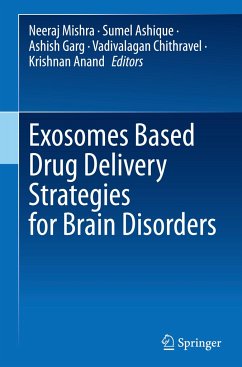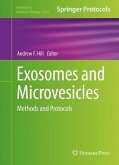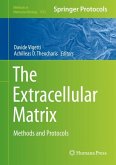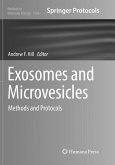Exosomes Based Drug Delivery Strategies for Brain Disorders
Herausgegeben:Mishra, Neeraj; Ashique, Sumel; Garg, Ashish; Chithravel, Vadivalagan; Anand, Krishnan
Exosomes Based Drug Delivery Strategies for Brain Disorders
Herausgegeben:Mishra, Neeraj; Ashique, Sumel; Garg, Ashish; Chithravel, Vadivalagan; Anand, Krishnan
- Gebundenes Buch
- Merkliste
- Auf die Merkliste
- Bewerten Bewerten
- Teilen
- Produkt teilen
- Produkterinnerung
- Produkterinnerung
This book provides a comprehensive overview of the role of exosomes in brain diseases, including stroke, multiple sclerosis, Parkinson's disease, Alzheimer's disease, epilepsy, and depression. It covers the basics of exosome biogenesis, composition, and synthesis, as well as the therapeutic potential of exosomes in brain disorders. The correlation between exosomes and neuroinflammation, the challenges of using exosomes as a novel carrier, and engineered exosomes to deliver therapeutic protein are covered well in this book. Use of radiolabelled exosomes as a diagnostic tool and the toxicity…mehr
Andere Kunden interessierten sich auch für
![Exosomes and Microvesicles Exosomes and Microvesicles]() Exosomes and Microvesicles123,99 €
Exosomes and Microvesicles123,99 €![Extracellular Vesicles as Matrix Messengers Extracellular Vesicles as Matrix Messengers]() Extracellular Vesicles as Matrix Messengers139,99 €
Extracellular Vesicles as Matrix Messengers139,99 €![The Extracellular Matrix The Extracellular Matrix]() The Extracellular Matrix154,99 €
The Extracellular Matrix154,99 €![Extracellular Vesicles Extracellular Vesicles]() Extracellular Vesicles178,99 €
Extracellular Vesicles178,99 €![Exosomes and Microvesicles Exosomes and Microvesicles]() Exosomes and Microvesicles77,99 €
Exosomes and Microvesicles77,99 €![Extracellular Vesicles Extracellular Vesicles]() Extracellular Vesicles127,99 €
Extracellular Vesicles127,99 €![Survival Strategies in Extreme Cold and Desiccation Survival Strategies in Extreme Cold and Desiccation]() Survival Strategies in Extreme Cold and Desiccation154,99 €
Survival Strategies in Extreme Cold and Desiccation154,99 €-
-
-
This book provides a comprehensive overview of the role of exosomes in brain diseases, including stroke, multiple sclerosis, Parkinson's disease, Alzheimer's disease, epilepsy, and depression. It covers the basics of exosome biogenesis, composition, and synthesis, as well as the therapeutic potential of exosomes in brain disorders. The correlation between exosomes and neuroinflammation, the challenges of using exosomes as a novel carrier, and engineered exosomes to deliver therapeutic protein are covered well in this book. Use of radiolabelled exosomes as a diagnostic tool and the toxicity studies of exosomes with potential overcome approaches. It is an essential resource for researchers, clinicians, and healthcare professionals working in the field of exosome research, especially on its applications in brain disorders.
Produktdetails
- Produktdetails
- Verlag: Springer / Springer Nature Singapore / Springer, Berlin
- Artikelnr. des Verlages: 978-981-99-8372-8
- 2024
- Seitenzahl: 468
- Erscheinungstermin: März 2024
- Englisch
- Abmessung: 241mm x 160mm x 31mm
- Gewicht: 807g
- ISBN-13: 9789819983728
- ISBN-10: 981998372X
- Artikelnr.: 69159045
- Herstellerkennzeichnung Die Herstellerinformationen sind derzeit nicht verfügbar.
- Verlag: Springer / Springer Nature Singapore / Springer, Berlin
- Artikelnr. des Verlages: 978-981-99-8372-8
- 2024
- Seitenzahl: 468
- Erscheinungstermin: März 2024
- Englisch
- Abmessung: 241mm x 160mm x 31mm
- Gewicht: 807g
- ISBN-13: 9789819983728
- ISBN-10: 981998372X
- Artikelnr.: 69159045
- Herstellerkennzeichnung Die Herstellerinformationen sind derzeit nicht verfügbar.
Dr. Neeraj Mishra is working as Professor in Amity Institute of Pharmacy, Gwalior since July 2019. He has around twenty years of teaching and research experience. He was recipient of ICMR- SRF (New Delhi, India). He worked as brand ambassador of Bentham Science, USA 2018-19. He has guided thirty M Pharm students and guided one Ph.D. student. He has more than 100 publications of International and National repute in recent concepts of novel drug delivery systems, Oral delivery of Synbiotics, localized drug delivery, targeted and controlled drug delivery of nanocarriers/ microparticles for the treatment of breast, colon cancer, and neurodegenerative disorders. Dr. Mishra more than 3200 citations with h- index 29. The total cumulative Impact Factor of his published papers is more than 300 (as per SCOPUS). He has also written more 15 Books and 25 book chapters in Elsevier, Bentham, Springer and Wiley Publication etc. He has also been granted 3 international patents and 3 Indian patents. Dr. Mishra is recipient of "Distinguished Professor Award" 2019 from DST-NSTMIS, SPAICS, Indore, and M.P. in September 2019. Dr. Mishra has also received the "Outstanding Scientist Award; 2020, 6th International. Scientist Awards on Engineering, Science, and Medicine, 20-21 June 2020, Chennai, India. Dr. Mishra has received the "Distinguished Professor Award; 2021 from Indian Pharmaceutical Association, MP State Branch, Indore. Dr. Mishra has received "Best Academician Award" in the Indian Pharmacy Graduate Association, M.P. State International Conference held on 06th May 2023 at DAVV Auditorium, Indore, India. He is also received one MPCST Project entitled "Dual functional colon- targeted tofacitinib and probiotics loaded microparticles for the treatment of Inflammatory Bowel Disease. Sumel Ashique has been working as an assistant professor in Pandaveswar School of Pharmacy, West Bengal, India. He has 3 years of teaching experience. He has achieved 50+ publications of International and national accredited reputed journals (Scopus, UGC). He has knowledge in drug delivery, nanotechnology and targeted treatment strategy. He has also 4 granted patents from IP and Australia, 6 published book chapters in International Books and 12 book chapters have been submitted to well-known publishers like Springer, Elsevier, Bentham and Taylor & Francis. Currently he is editing 5 books under CRC Press, Taylor and Francis, wiley and springer. Dr. Ashish Garg is working as Professor in Guru Ramdas Khalsa Institute of Science and Technology (Pharmacy), Jabalpur, M.P. He has around ten years of teaching and research experience. He has 80 publications in National and International journals of repute. He is an author of 27 book chapters and edited a few books on recent concepts of nanotechnology, novel drug delivery systems, cancer targeting etc. Dr. Ashish Garg has granted 3 international patents and published 3 Indian patents. He also acts as editorial board member and reviewer in various journals. Dr. Vadivalagan Chithravel is a postdoctoral research fellow (NIH, USA Project) at the University of Michigan, since2023. His study focuses on Exosomal transduction signals via miRNAs and cfDNAs and he has experience in the fields of molecular biology and biochemistry. In 2013, the Bharathiar University conferred on him a doctorate in Animal Biotechnology. He worked with SAARP Foundation as a Scientist and Group Leader, and from October 2012 to September 2019 his research helped the organization's Vector Borne Disease Control Program. Thereafter, from December 2019 to July 2021, he worked as a Postdoctoral Research Fellow at Taipei Medical University's Graduate Institute of Medical Science, where his research focused on circulating miRNAs and exosomal biomarkers for cellular physiology. Furthermore, he employed as an assistant professor of medicine at AKFA University from September 2021 to June 2022. His study focused on the regulation of metabolic disease via exosome-mediated miRNA delivery. Afterwards, he joined the China Medical University as a postdoctoral fellow during Aug 2022 to March 2023 and dealt on molecular cell signaling and drug toxicity. Dr. Vadivalagan now has a wide range of scientific contributions in the fields of molecular biology and biochemistry. Additionally, COI, a candidate gene for Species Identification, was assigned a 188 GenBank and 30 BOLD accession number. He has received multiple prestigious awards, including National Fellow for Ph.D. research (UGC National Fellow 2009-2012, India), Young Scientist Award (International Society of Zoological Science 2010, ISZS-China), Technology Talante Postdoctoral Fellow (MOST (NSTC) Taiwan 2019-2021), and Technology Talent Postdoctoral Fellow (MOST (NSTC) Taiwan 2022-2023). Dr. Krishnan Anand is working assenior lecturer in University of the Free State, South Africa since September 2022. He has expertise in organic chemistry/medical biochemistry/ integrative medicine/nano (bio) technology/drug discovery. He received his doctoral degree in organic chemistry in the Department of Chemistry, Durban University of Technology, in collaboration with the Department of Medical Biochemistry, University of KwaZulu-Natal, in 2014. He completed his master's degree in organic chemistry from Bharathiar University, India, and bachelor's degree in chemistry from Madurai Kamaraj University, India. He was Postdoctoral Researcher at Durban University of Technology, South Africa, from November 2014 to November 2016. Later, He worked as a Senior Researcher in the Discipline of Medical Biochemistry and Chemical Pathology, School of Laboratory Medicine and Medical Sciences, University of KwaZulu-Natal, Durban, South Africa from January 2017 to June 2019. He was recognized for his contributions and received awards from national and international organizations, including, best postdoctoral researcher Award for 2016 and 2017 from Durban University of Technology and Young Scientist Researcher Award 2016 from Pearl Foundation. He was evaluated by the National Research Foundation and was awarded a Y1 rating which is given to promising young researchers. In the latest list published by Stanford University, Dr Krishnan Anand was named in the Top 2% of the most influential scientists worldwide.
Chapter 1_ Introduction to Exosome and its role in Brain disorders.- Chapter 2_ Exosomes: Biogenesis, Composition and Synthesis.- Chapter 3_ Therapeutic Impact of Exosomes in Stroke and Transient Ischemic Attack (TIA).- Chapter 4_ Role of exosomes in Multiple Sclerosis.- Chapter 5_ Therapeutic impact of exosomes Stroke and Transient Ischemic Attack (TIA).- Chapter 6_ Role of exosomes in Parkinson's and Alzheimer's diseases.- Chapter 7_ Role of exosomes in Epilepsy and other Seizure Disorders.- Chapter 8_ Role of exosomes in management of depression.- Chapter 9_ Role of Microbiota-Derived Exosomes in Gut-Brain Communication for the treatment of brain disorders.- Chapter 10_ Advancement of Engineered Exosomes to deliver therapeutic protein cargos in brain disorders.- Chapter 11_ Correlation between exosomes and neuro inflammation in various brain disorders.- Chapter 12_ Recent challenges of exosomes as novel carrier in various brain disorders.- Chapter 13_Advancement of radiolabeled exosomes in brain disorders.- Chapter 14_ Exosomes as future diagnostic tool for brain disorders.- Chapter 15_ Toxicity studies of exosomes and the potential overcome approaches.
Chapter 1_ Introduction to Exosome and its role in Brain disorders.- Chapter 2_ Exosomes: Biogenesis, Composition and Synthesis.- Chapter 3_ Therapeutic Impact of Exosomes in Stroke and Transient Ischemic Attack (TIA).- Chapter 4_ Role of exosomes in Multiple Sclerosis.- Chapter 5_ Therapeutic impact of exosomes Stroke and Transient Ischemic Attack (TIA).- Chapter 6_ Role of exosomes in Parkinson's and Alzheimer's diseases.- Chapter 7_ Role of exosomes in Epilepsy and other Seizure Disorders.- Chapter 8_ Role of exosomes in management of depression.- Chapter 9_ Role of Microbiota-Derived Exosomes in Gut-Brain Communication for the treatment of brain disorders.- Chapter 10_ Advancement of Engineered Exosomes to deliver therapeutic protein cargos in brain disorders.- Chapter 11_ Correlation between exosomes and neuro inflammation in various brain disorders.- Chapter 12_ Recent challenges of exosomes as novel carrier in various brain disorders.- Chapter 13_Advancement of radiolabeled exosomes in brain disorders.- Chapter 14_ Exosomes as future diagnostic tool for brain disorders.- Chapter 15_ Toxicity studies of exosomes and the potential overcome approaches.








